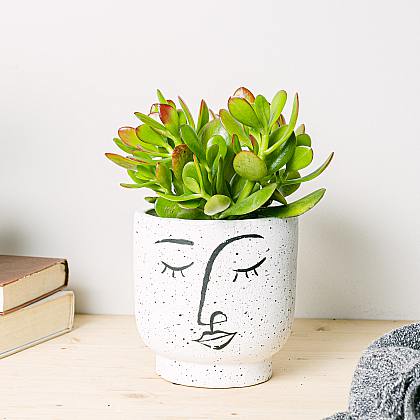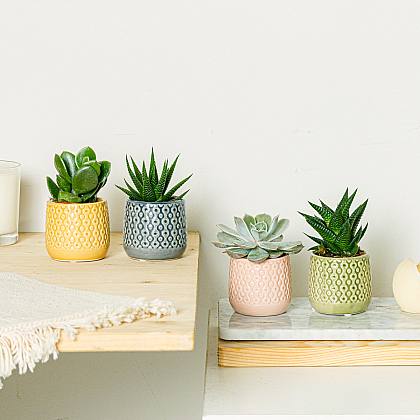Place Feng Shui houseplants in every room with these practical tips
Feng Shui is an ancient Chinese practice that seeks to harmonize energy in spaces to promote well-being and prosperity. One of the most effective ways to implement Feng Shui in the home is through the strategic placement of houseplants
Feng Shui is an ancient Chinese practice that seeks to harmonize energy in spaces to promote well-being and prosperity. One of the most effective ways to implement Feng Shui in the home is through the strategic placement of houseplants. In this article, we'll explore the power of plants according to Feng Shui, as well as the importance of choosing the right plant for each room. In addition, we will share practical tips on how to place plants in the bedroom, improve energy in the living room, increase productivity in the office, and purify the air in the bathroom. We'll also discover how to create a green oasis in the kitchen. Join us on this journey to a more balanced and lively home!
The power of plants according to Feng Shui
The power of plants according to Feng Shui lies in their ability to enhance energy and promote balance in indoor spaces. According to this ancient Chinese practice, plants are considered to be carriers of positive energy, capable of purifying the air and attracting good fortune. In addition, each plant is believed to have specific properties that can influence different aspects of our lives. For example, plants with rounded leaves are associated with abundance and prosperity, while plants with pointed leaves are considered protective and stimulating. Feng Shui also suggests placing plants near entrances to attract positive energy into the home and in areas where we need more vitality and harmony. However, it is important to keep in mind that some plants may be more suitable than others depending on the type of energy we want to enhance in each room. In general, green and healthy plants are considered to be the best options for balancing energy in any space. So if you want to harness the power of plants according to Feng Shui, don't hesitate to strategically incorporate them into your home or office to create a harmonious environment full of vitality.
The Importance of Choosing the Right Plant for Every Room
Choosing the right plant for each room is essential to maximizing the benefits of Feng Shui in the home. Each plant has its own energy and can affect the ambiance of the room in different ways. For example, plants with spiky leaves such as cactus or sansevieria are ideal to place in the driveway of the house, as they are believed to help repel negative energy. However, these plants are not recommended to place in the bedroom, as they can generate overly active energy that interferes with sleep.
For the bedroom, plants with a softer, more relaxing energy, such as lavender or jasmine, are recommended. These plants can help create a calm and relaxing environment that promotes rest and recovery. Instead, for the living room, it is suggested to use plants with large, rounded leaves, such as bamboo palm or ficus, which can help improve chi circulation and create a cozy atmosphere.
It is important to also consider the environmental conditions of each room when choosing a plant. For example, rooms with little natural light can benefit from plants such as fern or golden pothos, which require little light but can still purify the air. On the other hand, rooms with direct sunlight can be ideal for plants such as begonia or orchid.
In summary, choosing the right plant for each room is crucial to maximizing the benefits of Feng Shui in the home. It is important to consider both the energy of the plant and the environmental conditions of each room when making this decision.
Practical Tips for Placing Plants in the Bedroom
The bedroom is one of the most important places in the house, as it is where we rest and recover energy for the next day. Therefore, it is important to create a calm and relaxing atmosphere in this space. Some practical tips for placing plants in the bedroom are:
1. Choose plants that don't emit a lot of oxygen at night: Although plants are beneficial for purifying the air, some species emit more oxygen at night, which can interfere with our sleep. Therefore, it is better to opt for plants that produce less oxygen, such as sansevieria or fern.
2. Place softly flowering plants: Bright, colorful flowers can be too stimulating for the bedroom. Instead, opt for soft, soothing flowers like orchids, peace lilies, or jasmine.
3. Avoid plants with thorns or spiky leaves: Plants with spiky leaves or thorns can create an uncomfortable feeling in the bedroom. It's best to opt for plants with rounded, soft leaves like ivy or ficus.
4. Place plants in suitable places: It is important to place plants in places where they will not disturb while sleeping. Bedside tables, shelves, and windows are ideal places to place plants.
By following these practical tips, you can create a relaxing and healthy environment in your bedroom with the help of plants.
How to Use Plants to Improve Energy in the Living Room
The living room is the heart of the home, where we spend time with family and friends. To improve energy in this space, we can use plants that are not only beautiful, but also beneficial to our health and well-being. One of the best plants for the living room is the Boston fern, as it helps to cleanse the air of impurities and reduce humidity levels. Another option is the bamboo palm, which adds a tropical touch and improves air quality. In addition, bamboo is considered a lucky plant in Feng Shui. Flowering plants are also a great choice for the living room, as they bring color and joy to the environment. Lavender is a plant that not only smells delicious, but also has relaxing properties and helps reduce stress. Lastly, hanging plants like English ivy or pothos are great for adding texture and movement to the space. In conclusion, using plants in the living room not only improves its aesthetics, but also its energy and air quality.
Plants That Improve Productivity in the Office
Plants can play an important role in improving productivity in the office. According to Feng Shui, some plants are especially beneficial for creating a harmonious and stimulating work environment. One of these plants is lucky bamboo, known for its ability to attract positive energies and promote good luck and prosperity. Placing a lucky bamboo in the office can help maintain a balanced and conducive environment for work. Another recommended plant is the cactus, which is believed to absorb negative energies and protect against bad influences. In addition, plants with leafy, leafy greens, such as fern or bamboo palm, can improve air quality by absorbing toxins and releasing fresh oxygen. These plants can also help reduce stress levels and increase employee concentration and productivity. It is important to note that every workspace is different, so it is advisable to consult a Feng Shui expert to choose the most suitable plants according to the specific characteristics of the office. By incorporating productivity-enhancing plants into the office, a healthier and more stimulating work environment can be created for all employees.
Plants that help purify the air in the bathroom
The bathroom is a place where a lot of odors and moisture accumulate, which can lead to poor air quality. However, there are plants that can help purify the air in this room. One of them is the Aloe Vera plant, which not only has medicinal properties but also absorbs toxic substances such as formaldehyde and benzene, present in cleaning products and in the plastic of bathroom accessories. Another plant recommended for bathing is St. George's sword, which is moisture-resistant and removes carbon monoxide and other pollutants from the air. In addition, this plant is also known for its overall air-purifying properties. Another option is English ivy, which absorbs mold and bacteria present in the air, thus improving the air quality in the bathroom. Finally, the bamboo plant is another ideal option for this room, as in addition to being resistant to moisture, it absorbs chemicals and is very easy to care for. In conclusion, placing plants in the bathroom not only helps to purify the air but also gives a natural and fresh touch to this room.
How to Create a Green Oasis in the Kitchen
Creating a green oasis in the kitchen is a great way to add life and freshness to this very important space in our home. Plants not only provide a decorative touch, but they can also improve air quality and create a more relaxing and inviting environment. When choosing the right plants for the kitchen, it's important to consider the available natural light and available space. Some popular choices include aromatic herbs such as rosemary, basil, and coriander, which not only add flavor to our meals, but also release fresh fragrances into the air. Other recommended plants are succulents, which require little light and water, perfect for placing on shelves or countertops. In addition to traditional houseplants, we can also consider growing our own herbs and vegetables in pots or vertical gardens. This will allow us to enjoy fresh and healthy products directly from our kitchen. When creating a green oasis in the kitchen, we must remember to take proper care of our plants, watering them regularly and providing them with the right amount of light and nutrients. In this way, we will be able to enjoy the aesthetic and healthy benefits that plants offer us while we cook and spend time in this vital space of our home.
In short, Feng Shui offers us a way to harmonize our environment and improve our quality of life through the proper arrangement of indoor plants in each room. In addition to beautifying our spaces, plants can help us improve our physical and emotional well-being, as well as increase our productivity and creativity. However, it is important to note that each plant has its own characteristics and needs, so we must carefully choose the right species for each room. In this sense, Feng Shui provides us with a useful guide to make the most of the power of plants in our home or office. Do you dare to apply these tips in your own life and experience the benefits of Feng Shui?


